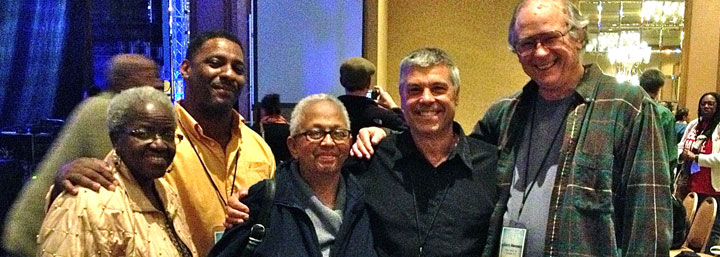Are we feeding poverty and starving solutions? Can WE imagine this?!
How do we alleviate poverty together?
Through collaborative problem solving
Through strategic division of labor
By strengthening relationships and community
Questions that need answers
Who’s in charge?
How can we overcome our doctrinal differences?
Who controls the funding?
Can people in my church serve the community at another church?
Will other churches steal parishioners?
Can churches and faith-based organizations work successfully alongside non-faith groups and government?
Rationale
Think about it: How long have the same people been coming to your food pantry or soup kitchen in crisis mode? It’s easy to come up with obstacles and reasons for not working together. But we’ve been in crisis mode for too long. Now is the time for real solutions.
It’s time to adopt more complete and holistic approaches to poverty.
It’s time for larger funders and officials to listen to what is working in neighborhoods.
It’s time for more affluent, suburban, mostly white churches to find ways to PARTNER with, not lead, churches and organizations dedicated to alleviating poverty in hurting neighborhoods.
It’s time to become more informed about the injustices that have continually led to inequality and abuse by initiating authentic discussions about racial matters, with a sincere commitment to discovering concrete solutions.
Building the Bridge
“Church groups can and should adopt the jigsaw classroom approach when engaging in cross-cultural situations. The truth is that we are a body composed of interdependent parts, each with unique, Godgiven abilities and perspectives. Unfortunately, even though the metaphor of the body of Christ preaches interdependence, we seem to believe that the fullness of truth is found in our culturally homogenous church groups. We are convinced that all the wisdom and knowledge that we need to succeed as Christian organizations is located within the boundary of our cultural group. Many Christian groups are like a 5000-piece puzzle that has 5000 duplicate pieces! This line of thinking—which is prevalent in the body of Christ—runs contrary to the interdependent identity of the body that is described in 1 Corinthians 12:14-27. If two groups differ significantly along ideological lines, I think it is particularly powerful and poetic for them search high and low for one important belief that they do have in common and build their cooperative project around that belief.”
Christian Community Development
Project URGE is a member of the Christian Community Development Association [CCDA] because of our close alignment with their mission. Project URGE has sponsored CCDA workshops, training and sent leaders and potential leaders to their conferences. The information we have obtained, assimilated and brought to our members from CCDA has been an invaluable resource for accomplishing our mission. Guests have included: Dr. John Perkins, Noel Castellanos (CEO of CCDA), Dr. Jimmy Dorrell and others.
Project URGE encourages all our affiliates to take advantage of CCDA resource materials and training opportunities. Please visit their website at www.ccda.org.
About CCDA
As members of this national group, we have attended multiple CCDA conferences which have offered 100's of workshops on ways to effectively accomplish goals in urban ministry related to economic development, working with the homeless and under-resourced, racial-reconciliation, becoming entrepreneurial, and much more.
In April of 2007, Project URGE hosted CCDA Institute classes here in Rochester. It was a two-day event that sponsored four comprehensive courses on: Urban/Suburban Partnerships; Youth Development; Economic Development in the Hood; and Wholistic Ministry.
In 2005 Dr. John Perkins and Cross Culture from Sandtown/Baltimore area had visited and conducted workshops here; then in 2010 Dr. Wayne Gordon, co-founder of CCDA spoke at the P & T and held workshops. In 2011 we had Dr. Perkins (John & Vera Mae Perkins Foundation/CCDA), Dr. Barbara Williams-Skinner (Skinner Institute/CCDA) and Jim Swearingen (Exec. Director for Buffalo Christian Center/CCDA), speak and give workshops.
We have also used our association with CCDA for information and contacts relative to specific urban ministry initiatives we are pursuing. In the summer of 2008, Noel Castellanos (CEO) spoke at our Fundraiser Dinner and our morning Community Forum. He also led the Project URGE board and leaders in a strategy building session at Risego.
We continue to send people from our area to both national and regional CCDA conferences as well as to invite nationally-recognized CCDA experts to come here to lead urban ministry-focused events in Rochester. More information will be available soon about our next Project URGE sponsored/CCDA affiliated event this fall.





